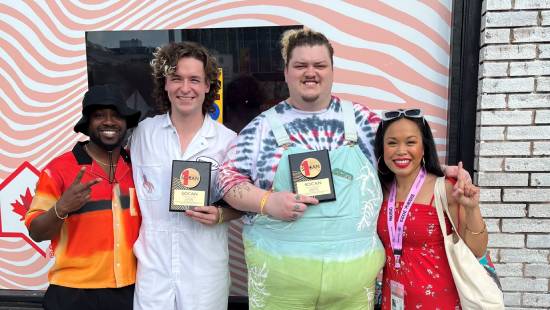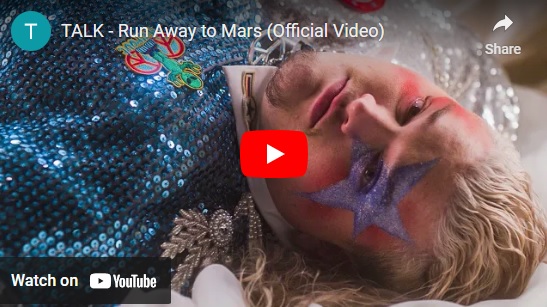TALK has come along way in the music industry.
He’s surpassed 90 million streams on Spotify alone, and more than 10 million views on YouTube. Reached No. 1 on Billboard‘s Adult Alternative charts. Played to more than 80,000 people, two years in a row, at the Festival d’été de Québec. Hit No. 1 on the TikTok viral chart in Norway, Denmark, Sweden, Finland, South Africa, Ireland, and the U.S (in a rare case, it was because of the videos he and his team created, not the ones made by others on the platform). Made his American television debut on The Late Late Show with James Corden. Signed a record deal with Capitol in the U.S. Received a SOCAN No. 1 Song Award. And contributed to the charity single “What I Wouldn’t Do,” to benefit Kids Help Phone’s Feel Out Loud campaign for youth mental health.
The key that opened all of these doors was his song, “Run Away to Mars,” recorded with only an acoustic guitar, an electric bass, no drums, and a glorious choir in the chorus, created by overdubbing TALK’s voice many times. Like David Bowie’s “Space Oddity” and Elton John’s “Rocket Man,” the song encapsulates the loneliness of the long-distance astronaut, so far away from home, and isolated on their own.
Below, TALK (born Nick Durocher, in Ottawa) discusses how the song was created, and how it went viral, twice, on TikTok:
“It was March 2020, the pandemic had just started. I went back to my parents’ place [in Ottawa]. I had this whole ‘Armageddon, the-whole-city’s-gonna-shut-down in Toronto, so I gotta get outta here’ thing [going on]… I was watching a lot of space movies, and just got inspired by these faraway places: where you could go, and how far away you could go. Everybody, including myself, wanted to get away from the pandemic. It just kind of clicked: ‘Hey, what if I ran away to Mars?’
“Middle of the night, I sat up. I had a guitar beside the bed the whole time I was there. I’d wait for silence, and then see if I could hear anything coming. And that melody just came. Sat up and played the whole song once, all the way through, with lyrics. I still have the original voice note for it somewhere. It was pretty much the whole song. There were a few things that changed when I edited it.
“I recorded it. Made a bunch of versions through April and May [of 2022], and ended up going back to that first version, just stripped back, with guitar and vocals. I think there’s, maybe, 10 tracks total in the mix of the song.
“Songs that are gonna be hits, whatever you call ‘hits,’ half of it’s the song, but half of it’s timing. I think it was just the right, perfect time. Everyone was feeling what I was feeling. It took more than a year to come out after I wrote it. We’d filmed the music video in November 2020, and the song came out in June 2021.

Receiving a SOCAN No. 1 Song Award. Left to right: Lord Quest (SOCAN); Connor Riddell, guitarist in TALK’s band, and one of the co-writers of “Run Away to Mars”; TALK; and Racquel Villagante (SOCAN).
“[At first] I was posting videos and getting 1,000 views, maybe, and that was a win. Then a couple came out, and it was like 200,000, 300,000, and ‘Wow, we did it! We really did it, guys!’ I went and signed a record deal, and the song was still doing well. It took till the next summer [of 2022], and that’s when it really jumped again on TikTok. We played a festival [Festival d’été de Québec] for a lot of people, and made what we thought at the time was just a video [of the performance]. We’re, like, ‘We may as well use this. We should just try.’ Then the first one had a few million [views], then every video we posted after that did the same. And it got picked up internationally, and radio…
“I think good songs just kind of happen. I think there’s elements you can control to increase the chance of having a great song – [if you’re co-writing,] the people in the room, your relationships with them, energies that work well together. [Writing on your own,] the best way I’ve heard it explained is… it’s like tuning a radio in your head, and eventually you just hear something: ‘Oh, that’s sweet, let me figure out if that works.’”
